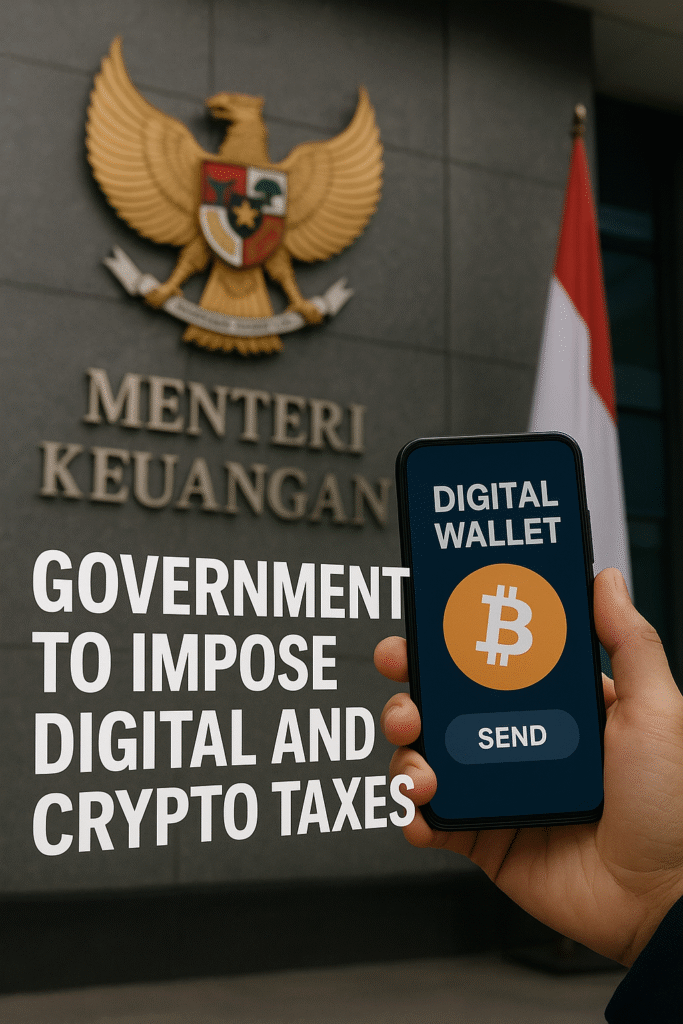Premium Biz Post – The announcement “Government to Impose Digital and Crypto Taxes” in Indonesia has stirred massive discussions among investors, traders, and even everyday citizens who rely on digital platforms for income. With the rapid growth of digital economies and cryptocurrency adoption, the Indonesian government is now taking stronger measures to regulate, tax, and monitor every transaction that takes place in this rapidly expanding industry.
This new policy is not just a simple change in taxation—it’s a shift that will affect millions of people, from small online sellers to big crypto whales. The message is clear: the government is getting serious about maximizing revenue from digital activities, and those who try to hide will likely face tougher scrutiny.
Why Indonesia is Targeting Digital and Crypto Sectors
Indonesia has one of the fastest-growing digital economies in Southeast Asia. With over 200 million internet users, online marketplaces, digital banking services, and crypto platforms have become part of daily life. The government sees enormous potential for taxation in this sector, which has previously been loosely regulated.
Cryptocurrency, in particular, has been a hot topic. Millions of Indonesians have invested in Bitcoin, Ethereum, and other altcoins in hopes of quick profits. According to reports, the value of crypto transactions in Indonesia has already reached billions of US dollars. For the government, leaving this sector untaxed is like leaving money on the table.

What the New Digital and Crypto Taxes Mean
The upcoming regulation will cover two major areas:
- Digital Economy Taxes – These will apply to online businesses, freelancers, e-commerce platforms, and digital services like streaming or online education.
- Crypto Taxes – Investors and traders will be taxed on both profits and transactions involving digital assets.
This means that every rupiah earned online could be subject to scrutiny, whether it comes from selling products on Tokopedia, offering services on Fiverr, or trading crypto assets on Binance. The government wants to ensure that digital players contribute their fair share, just like traditional businesses.
How Will This Affect Crypto Investors?
For crypto enthusiasts, the change could be both a challenge and an opportunity. On one hand, taxation will reduce net profits. On the other, it will legitimize the industry and encourage more traditional investors to enter the market, since regulations provide a sense of security.
Crypto traders may face:
- Capital gains taxes on profits from buying and selling.
- Transaction taxes each time they trade digital assets.
- Reporting requirements that demand full transparency of holdings.
This move signals that the government views cryptocurrency as a taxable financial instrument, not just a speculative digital token.
The Hunt for Digital Tax Evaders
The phrase “they’ll be hunted even more” is not just clickbait—it reflects the government’s intention to strengthen its monitoring systems. With advanced AI-based tax tracking and partnerships with major financial institutions, Indonesia will make it increasingly difficult to hide income from digital activities.
The government is also collaborating with crypto exchanges to access user data. This means anonymous trading is becoming harder, and those who fail to report their earnings risk facing hefty penalties.
Why Now?
There are three main reasons why Indonesia is accelerating this move:
- Economic Recovery – After the global economic downturn and COVID-19’s lingering impact, the government needs new revenue streams to fund infrastructure and public services.
- Digital Boom – Online business activities are growing exponentially, and the government wants to ensure fair taxation.
- Crypto Popularity – With so many Indonesians investing in crypto, the state sees an untapped goldmine in taxing digital assets.
Impact on Small Businesses and Freelancers
While large corporations may have the resources to adapt, small businesses and freelancers could feel the pressure. Many freelancers who earn in dollars through global platforms will now have to carefully calculate their taxes. Similarly, local sellers on e-commerce platforms will need to register and pay digital economy taxes.
For some, this may feel burdensome, but in the long run, it could also help establish more legitimacy and financial stability in the digital industry.
read more : “DIY Lifestyle: Creative, Independent, and Inspiring“
Comparing Indonesia With Other Countries
Indonesia is not alone in imposing digital and crypto taxes. The United States, India, Japan, and many European countries already have strict regulations in place. In India, for example, crypto transactions are taxed at 30%, sparking debates among investors.
By adopting a similar approach, Indonesia positions itself as part of the global movement to regulate the digital and crypto sectors, ensuring it doesn’t fall behind in managing the future economy.
The Double-Edged Sword of Regulation
While taxation brings more stability, it may also discourage some individuals from participating in the digital economy. Critics argue that high tax rates could push people back into informal or underground markets. Others warn that over-regulation might stifle innovation in fintech and blockchain industries.
However, supporters believe that these measures will create a healthier ecosystem, attract institutional investors, and increase government revenue that can be reinvested into public welfare.
What Should You Do as an Investor or Digital Entrepreneur?
With the changes ahead, here are a few strategies to prepare:
- Stay Informed – Keep track of official announcements and tax guidelines from the Ministry of Finance.
- Keep Records – Document every digital transaction, from e-commerce sales to crypto trades.
- Consult Professionals – Hire tax consultants or financial advisors who specialize in digital and crypto taxation.
- Plan Ahead – Consider tax-efficient investment strategies to minimize liabilities.
Being proactive will save you from penalties and help you adapt smoothly to the new system.
The Future of Digital and Crypto in Indonesia
Even though taxation may seem like a burden now, it could pave the way for a more mature market in the long run. By treating digital and crypto sectors as legitimate economic pillars, the government is acknowledging their importance in shaping Indonesia’s financial future.
In the next five to ten years, Indonesia may emerge as a regional leader in digital finance if it can balance regulation with innovation. This requires not just strict taxation but also supportive policies that encourage startups, blockchain development, and fintech growth.



